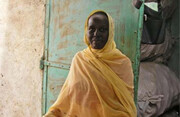The war in Darfur is four years old with no end in sight. The world community has acknowledged the gravity of the conflict, but Sudanese government–sponsored Arab janjaweed continue to attack Africans. Despite the death of an estimated 200,000 people and the displacement of another 2 million, Sudan has enjoyed record economic growth. The U.S. embargo has been ineffective, and attention is now attuned to the flow of money from Beijing to Khartoum.
Although tensions had been brewing and rebel groups uniting for some time, the conflict truly erupted in 2003 when the Darfur Liberation Front staged a successful and unprecedented attack on a Sudanese military installation in the city of Al Fashir. The DLF was hoping to draw attention to the unequal distribution of resources in the country, which mostly funnel to the capital in Khartoum. The government responded with coordinated attacks carried out by its military and its hired hands, the janjaweed.
The U.S. State Department's Country Reports on Human Rights Abuses reports that in Sudan in 2006 "the government continued to support the largely Arab nomad janjaweed militia, which terrorized and killed civilians, raped women, and burned and pillaged the region. During the year the government resumed aerial bombardment of civilian targets, including homes, schools, and markets." The ongoing crisis has produced a humanitarian calamity, as millions of homeless Darfuris in the country and thousands more in neighboring Chad are in need of nourishment, medicine, and protection.
Meanwhile, 600 miles away in Khartoum, there is a frenzy of construction. Sudanese and Chinese workers are building a "new Dubai," a four billion dollar development replete with offices, duplexes, and golf courses. The development will house the Greater Nile Petroleum Operating Company and Petrodar, both of which are Chinese-Malaysian-Indian-Sudanese joint ventures. Khartoum has not felt the poverty that affects the rest of the country, due to oil revenues and the $2.3 billion in direct foreign investment the government has collected this year.
Chinese investment and loans have allowed Sudanese President Omar al-Bashir to begin many new projects, including building roads, schools, and even a new palace. China is attempting to spread its influence and commercial activities in other African countries as well. At a two-day summit in November, Chinese President Hu Jintao promised African leaders $3 billion in loans, $2 billion in export credits, and a $5 billion fund to encourage Chinese investment in Africa by 2009. Anticipating possible criticisms for its involvement with rogue states like Sudan, Chinese Premier Wen Jiabao said his country will do everything it can to ensure that projects are "open, just, fair and transparent."
China has been developing Sudan's oil industry since the U.S. embargo went into effect in 1997 as a response to the civil war raging between the north and south. Oil development has included the construction of a 1600-kilometer pipeline, infrastructure to support transport, and the extraction of about 510,000 barrels of crude oil per day. China buys two-thirds of Sudan's oil and supplies the military with weapons and aircraft. President Hu has followed a policy of noninterference on the Darfur issue and has resisted pressuring President Omar al-Bashir to stop the attacks.
But recently China has bowed to increasingly critical world opinion and entreated al-Bashir to agree to the admittance of the 22,000 UN troops called for in Resolution 1706. "We can see that the Darfur issue is very complicated and sensitive… We hope that Sudan can hold equal consultations with all parties concerned and push forward a final, political solution of this issue," Chinese Foreign Ministry spokesman Liu Jianchao said at a recent briefing.
While Chinese acknowledgment of the crisis in Darfur is a first step, it won't end the violence. "China will certainly not do anything to hurt the freedom of Africa and its people," President Hu said at an address during the South African leg of his recent eight-country tour of Africa. Nevertheless, there is a gap between words and deeds. The New York Times reports that an estimated 70% of the government's oil profits are spent on defense. China's sale of military equipment and aircraft to the government implicates it in the atrocities committed daily.
The American embargo can only be effective if China follows suit. If Sudan loses China, it will signal a shift in world opinion. "The Americans are not a threat, but if the international community lines up against us, ahh, that is a different issue," Osama Daoud Abdellatif, a businessman who owns Sudan's new Coca-Cola factory, told The New York Times.
With Chinese economic help, Sudan's GDP may grow by 12 percent this year. No one knows how high the deaths in Darfur will climb. Because of China's large financial stake in Sudan, it will likely continue to veto stronger UN resolutions. Darfur's hopes rest with Beijing's international leadership.
Further Reading
Darfur Collides With Olympics, and China Yields
Helene Cooper, New York Times (April 13, 2007)
Mia Farrow and Steven Spielberg are involved in an effort to pressure China to stop protecting Sudan's government.





